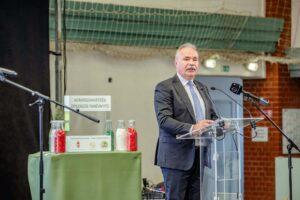More than 3,300 young people will begin their studies in agricultural vocational training
3,316 young people will begin their studies in the 2025-2026 academic year in the 52 vocational training institutions maintained by the Ministry of Agriculture – the Minister of Agriculture announced on Monday in Kiskunfélegyháza, Bács-Kiskun County.

(Photo: AM/Tibor Vermes)
István Nagy spoke at the opening of the national academic year of the Southern Agricultural Vocational Training Center Kiskunfélegyháza Agricultural and Food Industry Technical School, Vocational Training School and Dormitory, and also agricultural vocational training, that the Hungarian vocational training system, and agricultural vocational training in it, are considered among the best in international rankings. He called it an important aspect that the path from the vocational training system to higher education is now much easier, for which cooperation between institutions and certified technician training provide a good basis. He added that this year more than 3,200 students were admitted to state-supported agricultural higher education courses. “Good professionals will always have a place in agriculture, because humanity will always need food and drink,” he added. As he said, Hungarian agricultural vocational training is not only about mastering a profession, but also about young people finding a vocation in it, which is why the Ministry of Agriculture, as the maintainer of agricultural vocational training, has placed the institutional system on new foundations in recent years. Instead of the previous, fragmented structure, there are now five agricultural vocational training centers that coordinate the work, resources and developments of the schools belonging to them, he emphasized. The Minister of Agriculture called the operation of the centers successful based on the experiences so far, as they focus on which sectors provide livelihoods in the given region, and adjust training and developments accordingly. “We treat the development and modernization of our schools as a priority,” he said, explaining that the Hungarian government provided special development support under the Rural Development Program to educational institutions under the management of agricultural vocational training centers, one billion forints per center. The amount was used to purchase power and work machines, food industry machines, precision equipment, and IT tools for the schools, but there were also places where infrastructural developments were implemented: new workshops, demonstration plants, and laboratories were built, he listed.
New training courses are starting
István Nagy also spoke about the fact that from September 2025, the training range has been expanded with two new professions, the animal health and food safety technician and the confectionery technician, which proves that “agricultural vocational training can flexibly and quickly adapt to market conditions and changing needs”. The minister announced that the Hungarian Agricultural Newspaper Publishing House Ltd., in cooperation with the Hermann Ottó Institute Nonprofit Ltd., has enabled the digital availability of the newspapers it manages in all secondary institutions. According to Sándor Lezsák, Deputy Speaker of the Parliament and the Fidesz MP for the region, agriculture is a priority area not only from the perspective of the national economy but also from the perspective of national security. We must protect farmland as a national asset and the genetic purity of products, but we must also take care of the protection of farmers’ interests and protect the independence of agricultural management – he said.
Generational change, digitalization
Zsuzsanna Szerdai, the general director of the Southern Agricultural Vocational Training Center, spoke about the fact that generational change is inevitable in an aging agricultural society, but attracting young people requires modern knowledge, experience-based learning and the natural integration of the use of digital tools. She recalled that the Kiskunfélegyháza Agricultural and Food Industry Technical School, Vocational Training School and Dormitory had undergone exemplary development in recent times. As part of a demonstration plant tender, equipment procurement and infrastructure development worth approximately 500 million forints were implemented, and the school’s dormitory building was also renovated. In the future, modern agricultural and meat industry machinery and a horse simulator will assist in practical training, and the fattening shed located in the school’s stables was also renovated, the general director listed. Pál Rózsa, the educational director of the Kiskunfélegyháza Agricultural and Food Industry Technical School, Vocational School and Dormitory, said that they started this school year with 487 students, including 160 new enrollees and 180 college students, while 650 applied for adult education and training. He explained that they can realize the “from farmland to table!” concept, since they farm 211 hectares on their school farm, and in addition to their four horseshoe-certified riding stables, there is a 30-sow pig farm, a breed demonstration flock of sheep, and native and meat-use cattle at the service of production and education. The crops produced in the horticulture are processed in the vegetable and fruit school processing workshop, while the animals fattened on their own feed are processed in the meat school farm. Their products are sold in their model shop The school’s operating income in the 2024 financial year was 252 million forints, he added.
AM/MTI.
Related news
Avian influenza has appeared in a new farm in Csongrád-Csanád County
🎧 Hallgasd a cikket: Lejátszás Szünet Folytatás Leállítás Nyelv: Auto…
Read more >UBM may continue its international expansion
🎧 Hallgasd a cikket: Lejátszás Szünet Folytatás Leállítás Nyelv: Auto…
Read more >Serbian farmers block roads to protest cheap imports
🎧 Hallgasd a cikket: Lejátszás Szünet Folytatás Leállítás Nyelv: Auto…
Read more >Related news
Festival buzz at the 60th anniversary EuroShop trade fair
🎧 Hallgasd a cikket: Lejátszás Szünet Folytatás Leállítás Nyelv: Auto…
Read more >A stable compass in the Hungarian FMCG sector for 20 years
🎧 Hallgasd a cikket: Lejátszás Szünet Folytatás Leállítás Nyelv: Auto…
Read more >









